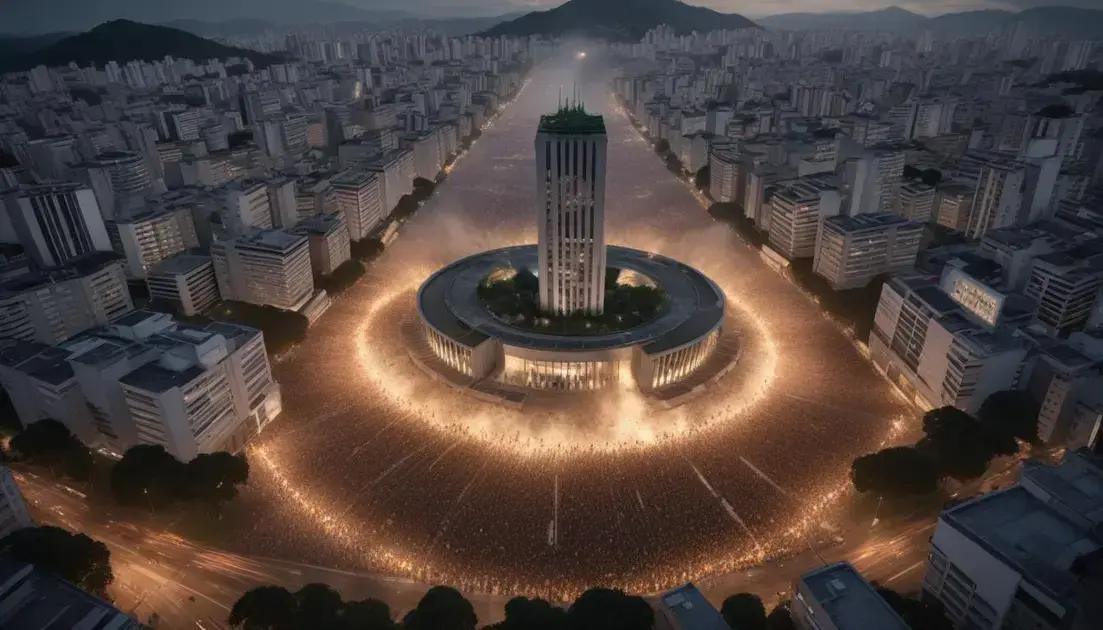
Post Office Scandal: The First Major Mensalão Case in Lula’s Government
The Mensalão Scandal, a major political event in Brazil, exposed serious corruption within Lula’s government in 2005. It revealed how public funds were misused through fake contracts, leading to widespread public outrage and protests. The scandal significantly impacted media practices, making journalism more investigative and holding politicians accountable. This event reshaped public trust in politics, highlighting the need for transparency and ethical governance in Brazil.
The Mensalão scandal shook Brazil like a thunderbolt, revealing deep corruption within the government. How did this all come to light? Let’s dive right in!
Introduction to the Mensalão Scandal
The Mensalão Scandal first came to light in 2005. It revealed a big problem within Brazil’s government. Many people were shocked to learn how public funds were misused.
This scandal focused on the Post Office and showed how lawmakers used fake contracts. They took money meant for public services. This made many citizens lose trust in their leaders.
As the details came out, more and more people began to pay attention. The media played a big part in uncovering the truth. They asked tough questions and demanded answers from those in power.
Many thought this event would change everything in Brazilian politics. The scandal not only revealed corruption but also showed how deep these issues ran. Public anger grew as citizens felt betrayed by those they elected.
To this day, the Mensalão remains a key point of discussion in Brazil. It serves as a lesson about transparency and accountability in government. People want their leaders to act honestly and with integrity.
How the Scheme Unfolded
The Mensalão Scandal unfolded in several troubling steps. It all began with secretive agreements and fake contracts. Lawmakers were involved in misusing public funds.
At first, many people didn’t understand the full scope of the corruption. Reports slowly came out, revealing shocking details. Investigations by the Central Bank played a crucial role in exposing the truth.
As the situation developed, more evidence surfaced. Documents showed how money was funneled to politicians in exchange for support. This made people very angry. Families saw their taxes being wasted.
Protests exploded across Brazil as citizens demanded justice. The media spotlighted certain figures involved in the scandal. Lawmakers who were trusted became the subjects of public outrage.
Investigators found connections between political parties and powerful business interests. It revealed a deep-rooted system of corruption that went beyond just a few individuals.
This scandal changed Brazil forever. It highlighted the need for greater transparency and accountability in politics. Many voters became more engaged and aware of their rights.
Impact on Lula’s Government
The Mensalão Scandal had a huge impact on Lula’s government and Brazilian politics overall. Trust in the government took a major hit. Many people started to doubt the integrity of their leaders.
When the scandal broke, it led to widespread protests. Citizens felt betrayed by those they elected. Many were angered to learn about the misuse of public funds.
As this unfolded, several key political figures faced serious consequences. Some were even forced to resign. This reshaped the political landscape in Brazil for years.
The government tried to control the damage. However, the scandal exposed deep-rooted issues. It pushed politicians to reconsider their actions and the way they do business.
Media coverage was intense and relentless. Journalists played a vital role in ensuring the truth came to light. This increased public awareness of corruption in politics.
The Mensalão not only affected Lula’s administration but also sparked conversations about governance. Discussions about ethics and transparency became more mainstream. People demanded better accountability from their leaders.
Changes in Media and Politics
The Mensalão Scandal brought big changes to both media and politics in Brazil. It shook the trust people had in their leaders. After the scandal, the media became more vigilant and investigative.
News outlets began to dig deeper into government actions. Journalists pushed for transparency. They started reporting on issues that many had ignored before.
This focus on corruption led to more public interest. Citizens became more aware of political matters. They wanted to know how their taxes were being spent.
Political figures learned they could no longer hide behind their positions. The media’s role changed from passive to active, making it harder for politicians to avoid accountability.
The scandal also encouraged more whistleblowers to come forward. People felt empowered to speak out against corruption. This shift improved the quality of public discourse.
Overall, the Mensalão changed how politics is covered in Brazil. It opened doors for new discussions about ethics and responsibility in governance.
Conclusion
The Mensalão Scandal is a crucial chapter in Brazilian history. It showed how corruption can damage public trust.
Lessons learned from this scandal still resonate today. Citizens now pay more attention to political actions and accountability.
In the wake of the scandal, many Brazilians want honest leadership. Political awareness is higher than ever.
As discussions about ethics and transparency continue, the media plays a vital role. They keep the public informed and engaged.
The Mensalão serves as a reminder that citizens must hold leaders accountable. Together, they can work for a government that truly serves the people.
Conclusion
In conclusion, the Mensalão Scandal was a significant event that changed Brazil’s political landscape. It highlighted the importance of trust between citizens and their leaders. The lessons learned from this scandal continue to shape public discussions about honesty and accountability.
As people become more aware of political issues, they demand better governance. The media’s role in uncovering corruption has never been more vital. By keeping the public informed, they encourage citizens to stay engaged.
Ultimately, it’s clear that accountability matters. Citizens need to hold their leaders responsible for their actions. Together, they can work towards a government that truly reflects their needs and values.


